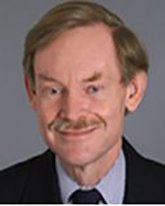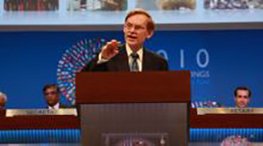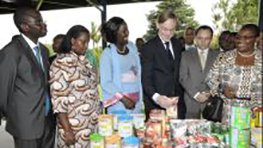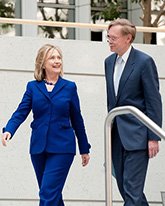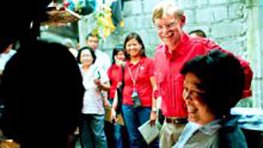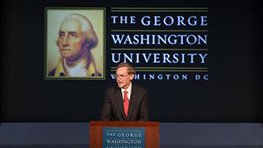11th President of the World Bank Group, July 1, 2007 - June 30, 2012
Robert B. Zoellick served as the president of the World Bank Group from July 1, 2007, to June 30, 2012. His tenure was marked by the global financial crisis of 2008-2009, and Zoellick worked closely with the International Monetary Fund and major economic nations to help affected countries manage the economic emergency. He pushed through a major increase in the Bank’s capital resources. And he transformed the Bank through a sharpened focus on anti-corruption strategies and on greater access for the public to Bank information.
Personal History
Robert Bruce Zoellick was born July 25, 1953, in Naperville, Illinois. He graduated in 1975 from Swarthmore College and in 1981 received both a J.D. from Harvard Law School and a Master of Public Policy degree from Harvard's John F. Kennedy School of Government. After law school he clerked for Judge Patricia Wald in the U.S. Appeals Court for the District of Columbia Circuit.
For the next 25 years Zoellick moved between government and the private sector in a series of increasingly important posts. In the U.S. government he served in the Treasury and State Departments and in the White House of George H.W. Bush, and between 1993 and 1997 was Executive Vice President of Fannie Mae, the government housing finance corporation. After 1997 he was a senior advisor to Goldman Sachs and had various academic appointments. He returned to government as the U.S. Trade Representative (2001-2005) and Deputy Secretary of State (2005-2006). Immediately prior to joining the Bank Zoellick was Vice Chairman, International, of the Goldman Sachs Group, Managing Director, and Chairman of Goldman Sachs’ Board of International Advisors.
Zoellick married Sherry Ferguson in 1980.
The Setting
Zoellick found a Bank roiled by the controversy that had led to the resignation of Paul Wolfowitz. An external campaign to choose a non-U.S. citizen as Bank president had failed, and Zoellick had to win over those who had resisted his nomination. Wolfowitz left behind a number of initiatives that were conceptualized but not actualized, all of which required additional resources to carry through. Relationships with NGOs were frayed over their opposition to the Bank-supported Chad-Cameroon pipeline.
And in 2007 Apple Inc. introduced the iPhone, which would shift usage from laptops to phones with touchscreens that incorporated computer functions. By the end of Zoellick’s presidency, iPhones were in widespread use in the Bank.
Six strategic themes
One hundred days after he became Bank president, Zoellick laid out six strategic themes for his presidency in a speech to the National Press Club in Washington, D.C. They were:
- Help overcome poverty and spur sustainable growth in the poorest countries, especially in Africa and with focus on achieving the Millennium Development Goals.
- Address the special problems of states coming out of conflict or seeking to avoid the breakdown of the state.
- Adopt a more differentiated business model for the middle income countries.
- Play a more active role in fostering regional and global public goods that transcend national boundaries and benefit multiple countries and citizens.
- Support those seeking to advance development and opportunities in the Arab World.
- Use the knowledge and learning in the Bank to support the other five strategic themes.
In the February 2012 press release announcing that he was stepping down at the end of his five-year term, these six themes had evolved into three areas of leadership during Zoellick’s presidency: nimble,activist crises initiatives; a modernized World Bank; and modernized multilateralism.
Crises initiatives
Financial recovery. Between July 2008, just before the full impact of the financial crisis hit, and April 2010 the Bank made $100 billion in financial commitments to help countries respond to and recover from the global downturn. This support was an all-time high for the Bank, and in recognition of a world food crisis, the Bank’s spending on agriculture increased to $6 billion per year.
In April 2010 Zoellick pushed through the Development Committee of the Board of Governors of the Bank the first general capital increase for the Bank in over 20 years, accompanied by increased voting power for developing countries. The package included an increase of $86.2 billion in capital for the International Bank for Reconstruction and Development (IBRD), a $200 million increase in the capital of the International Finance Corporation (IFC), a 3.13 percentage point increase in the voting power of Developing and Transition Countries (DTCs) at IBRD bringing them to 47.19 percent, an increase in the voting power of DTCs at IFC to 39.48 percent, and an agreement to review IBRD and IFC shareholdings every five years with a commitment to equitable voting power between developed countries and DTCs over time. In addition, the Committee backed the Bank’s post-crisis strategy and a series of operational reforms.
With an emphasis on the role of the private sector, the Bank created a new Asset Management Company to channel sovereign wealth funds and pension resources to the private sector in Africa and other emerging markets. And the Bank looked to alternate sources for its funds: as of June 30, 2008, the World Bank Group administered 1,020 trust funds (funds established with contributions from one or more donors to support development related activities which World Bank Group administered in agreement with the donors) amounting to US$26.3 billion, up by 23 percent from a year earlier. Many of the largest trust funds were devoted to global public goods‐related activities, such as controlling the spread of infectious disease and mitigating climate change.
Warfare. The 2011 World Development Report (WDR) focused on Conflict, Security, and Development. In his foreword to the volume Zoellick, noting that he had given a speech on this topic in 2008, wrote, “When state institutions do not adequately protect citizens, guard against corruption, or provide access to justice; when markets do not provide job opportunities; or when communities have lost social cohesion—the likelihood of violent conflict increases.” In March 2011 the Board of Executive Directors discussed the means to operationalize the findings of the WDR, and the Chair’s summary of the discussion was that it “highlighted one of the WDR’s key conclusions, that violence and other challenges plaguing fragile and conflict affected states (FCS) cannot be resolved by short-term or partial solutions in the absence of credible and functional institutions that provide people with citizen security, justice and jobs. Directors agreed these challenges necessitated a paradigm shift for the development community.”
Natural disasters. In 2009 the Bank launched the “MultiCat” program, a “catastrophe bond issuance platform that gives governments and other public entities access to international capital markets to insure themselves against the risk of natural disasters”—the first time a program was designed “specifically to help governments from developing countries access affordable insurance coverage through the capital markets.” After the Haiti earthquake in January 2010, the Bank quickly announced that nearly half a billion dollars would be available for recovery and development through June 2011, including the total cancellation of Haiti’s remaining World Bank debt. The Bank also took on the fiscal management of the multi-donor Haitian Reconstruction Fund.
Climate Investment Funds (CIF) was an initiative from the Wolfowitz presidency that was implemented under Zoellick’s leadership. In 2008 the Bank’s Board of Executive Directors agreed to establish the Clean Technology Fund and the Strategic Climate Fund, in cooperation with four other multilateral development banks (Asian, African, European and Inter-American). Shortly thereafter the G-8 countries endorsed the CIF, and the World Bank became a “trustee” of the funds approved (fourteen countries pledged a total of $8.1 billion to the CIF, and the Bank believed it could “leverage” an additional $57 billion “from other sources”). By 2014, reported an independent evaluation commissioned by the five banks, the CIF was “providing 63 developing and middle income countries with urgently needed resources to mitigate and manage the challenges of climate change and reduce their greenhouse gas emissions.”
Modernized Bank
Organization. In February 2007 the Bank under Paul Wolfowitz had created an independent panel of experts to review the operations of the Department of Institutional Integrity (INT). Reporting in September to new Bank president Zoellick, the group, headed by Paul Volcker, the former head of the U.S. Federal Reserve, recommended a major strengthening of the organizational relationships and role of INT. It also urged the World Bank to be “at the frontier of best international practice in tackling corruption.” Following this report, Zoellick established a High Level Commission on the Modernization of World Bank Group Governance, led by former Mexican President Ernesto Zedillo, which in October 2009 recommended that the Bank “enhance voice and participation, restructure the World Bank Group’s governing bodies, reform the leadership selection process, strengthen management accountability and strengthen the World Bank Group’s resource base.”
Anti-corruption. Zoellick pressed forward on the Bank’s anti-corruption efforts. In 2009 the Bank decided to make public the names of all companies that were debarred from receiving direct contracts from the Bank Group under its corporate procurement program: a name and shame strategy. Calling the rule of law the “the center of the development agenda,” in 2010 Zoellick launched an International Corruption Hunters Alliance, a group of national anti-corruption investigators and prosecutors to “work together to catalyze partnerships and opportunities to step-up bribery prosecutions, share investigative information, increase efforts to collect and return illegal proceeds, develop mechanisms to monitor and disclose results and step up efforts to fight fraud and corruption in fragile states.” The Bank signed a Memorandum of Understanding with INTERPOL on October 7, 2010, agreeing to provide information “to assist in the detection, substantiation and prevention of fraud and corruption,” to undertake joint activities “where appropriate” and to “facilitate and expedite the effective and confidential transmission of information.”
Zoellick faced a sharp test of the commitment to anti-corruption over the Bank’s support of the Chad-Cameroon pipeline. In 2001 the Bank provided financing to Chad for the project with a specific agreement that substantial oil revenues would be directed to poverty reduction. An international advisory group was established to provide independent oversight of the program, along with a Chadian committee that included members from civil society. NGOs had opposed the project from its beginning, and by 2008 it was clear that, in the words of the Bank’s Independent Evaluation Group in 2009, the “agreed allocation target was missed by a significant margin” and in fact “the oil revenue windfall was associated with a resurgence of civil conflict and a worsening of governance.” In August 2008 Zoellick decided to end the Bank’s participation in pipeline, and Chad repaid the outstanding balances on the IBRD loan and on the two IDA credits, for the first time in Bank history.
Knowledge sharing. The Board of Executive Directors approved a landmark policy on access to information, which went into effect on July 1, 2010. The policy represented a fundamental change in the Bank’s approach to disclosing information, allowing the public to get more information than ever before about projects under implementation, analytic and advisory activities, Board proceedings, and historical materials.
In a major speech at Georgetown University in September 2010, Zoellick argued that the world is now “multi-polar” and requires “multi-polar knowledge.” He said that four sets of problems merited future research: better understanding of how economic transformation happens, how access to economic opportunities can be broadened, how to meet “new global challenges of dealing with risks facing economies and people” from climate change to wars, and a focus on results. In order to do the latter, he said, “We will need to gather more evidence and data to assess the effectiveness of development efforts, including aid.” He then announced “an entirely new approach: Open Data, Open Knowledge, Open Solutions.” Saying “the Bank remains the largest single source of development knowledge,” Zoellick lauded the Bank’s new Open Data Initiative to provide even more Bank-held information for public use and cheered the development of new software and models, all towards the goal of “a fundamentally new way of searching for development solutions, in a networked development architecture, where none dominates and all can play a part.” In 2012 the Open Knowledge Repository opened on the Bank’s website, a direct result of Zoellick’s focus on information.
Multilateralism
Zoellick championed major regional initiatives, in the Arab World, Eastern Europe, Asia and Africa.
- The Arab World Initiative, announced in October 2007, aimed to strengthen “development and opportunity in the Arab World by advancing sub-regional integration and the integration of this region with the global economy, and achieving faster growth, better jobs, lower disparities, greater social inclusion, and better management of natural resources especially water.”
- In November 2007 the Bank opened the Vienna Centre for Financial Reporting Reform (CFRR) “to better assist countries in Europe and Central Asia in meeting the financial reporting standards needed for EU accession and to meet the emerging needs of middle income countries in the Region.” The CFRR’s activities were both fee-for-service based and funded by donors.
- In June 2009, the Bank and the Government of Singapore established the Singapore Hub, a joint center for offering expertise on integrated urban development and infrastructure financing solutions. It expanded in 2010 to create an Infrastructure Finance Center of Excellence within the Hub, “to support regional governments in tapping private capital for infrastructure.”
- And in 2012 the Bank opened the Global Center on Conflict Security and Development in Nairobi, Kenya, working out of the headquarters of Shelter Afrique, an NGO, not out of the Bank’s office. The Bank announced that the Center will help “establish a stronger community of practice and knowledge-sharing across the worldwide network for practitioners who work on development issues confronting fragile and conflict-affected countries.”
The shift in five years was significant: from a network in a style that had existed previously in the Bank, to a joint center with a government, to an entirely new model of a center lodged not with a government but with an NGO.
Zoellick also pushed the Bank to cooperate closely with UN agencies. With the World Health Organization, the Bank in 2011 issued the first ever World Report on Disability, providing the first global estimate in 40 years of the number of persons who have some form of disability (more than one billion people) and an overview of the status of the disabled in the world. The same year he signed a Memorandum of Understanding with UNESCO, providing a framework for technical cooperation in preserving and rehabilitating historic cities, promoting cultural diversity, conserving natural heritage sites, and addressing the “economics of culture.”
Departure
On February 15, 2012, Zoellick announced that he would step down at the end of his five-year term. “The bank is now strong, healthy and well positioned for new challenges,” he said, “and so it is a natural time for me to move on and support new leadership.”
